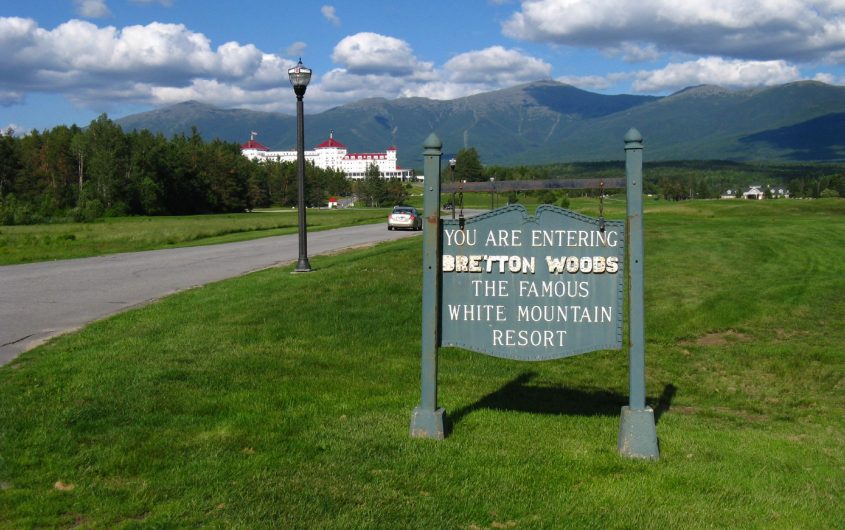
Jasperdo via Flickr
Cooler Climes, Cooler Heads: The Bretton Woods Conference at 75

Peter S. Rashish
Vice President; Director, Geoeconomics Program
Peter S. Rashish, who counts over 30 years of experience counseling corporations, think tanks, foundations, and international organizations on transatlantic trade and economic strategy, is Vice President and Director of the Geoeconomics Program at AICGS. He also writes The Wider Atlantic blog.
Mr. Rashish has served as Vice President for Europe and Eurasia at the U.S. Chamber of Commerce, where he spearheaded the Chamber’s advocacy ahead of the launch of the Transatlantic Trade and Investment Partnership. Previously, Mr. Rashish was a Senior Advisor for Europe at McLarty Associates, Executive Vice President of the European Institute, and a staff member and consultant at the International Energy Agency, the World Bank, UN Trade and Development, the Atlantic Council, the Bertelsmann Foundation, and the German Marshall Fund.
Mr. Rashish has testified before the House Financial Services Subcommittee on International Monetary Policy and Trade and the House Foreign Affairs Subcommittee on Europe and Eurasia and has advised three U.S. presidential campaigns. He has been a featured speaker at the Munich Security Conference, the Aspen Ideas Festival, and the European Forum Alpbach and is a member of the Board of Directors of the Jean Monnet Institute in Paris and a Senior Advisor to the European Policy Centre in Brussels. His commentaries have been published in The New York Times, the Financial Times, The Wall Street Journal, Foreign Policy, and The National Interest, and he has appeared on PBS, CNBC, CNN, NPR, and the BBC.
He earned a BA from Harvard College and an MPhil in international relations from Oxford University. He speaks French, German, Italian, and Spanish.
As the nation’s capital swelters in an atmosphere that seems to confirm President Kennedy’s quip that “Washington is a city of Southern efficiency and Northern charm,” it might be restorative to look both back and north. That action could help provide a cooler head to gain some context for what is plaguing the global economy today.
It was exactly 75 years ago this week that representatives from 44 countries were meeting at the Mount Washington Hotel in Bretton Woods, an area nestled in New Hampshire’s White Mountains, to engage in some institution building. While World War II was not yet over, an Allied victory was certain enough that the U.S. and British governments thought it was time to consider new arrangements for the postwar international economy. The key idea was to prevent a repetition of the beggar-thy-neighbor policies of the 1930s—competitive currency devaluations, protectionist trade barriers, and closed trading blocs.
The key idea was to prevent a repetition of the beggar-thy-neighbor policies of the 1930s—competitive currency devaluations, protectionist trade barriers, and closed trading blocs.
Officially called the “United Nations Monetary and Financial Conference,” the Bretton Woods gathering gave birth to the International Monetary Fund and the World Bank. Ratification by the two organizations’ member countries was fairly swift and smooth, so that by the end of 1945 they were both in operation at their headquarters in Washington.
What is perhaps less well known about Bretton Woods—but still instructive—is its links to trade policy. The two main concerns of the conference were orderly financial and monetary relations (the IMF) and postwar reconstruction (the World Bank). But the Bretton Woods official proceedings also provide a mandate to participating governments on trade, recommending that “in addition to implementing the specific monetary and financial measures which were the subject of this Conference, they seek…[to] reduce obstacles to international trade and in other ways promote mutually advantageous international commercial relations.”
The governments took the cue and proceeded on two fronts. First, they created the General Agreements on Tariffs and Trade, which came into being in 1947. Second, as the GATT was intended as a short-term placeholder, they also took steps to create a more ambitious International Trade Organization (ITO) that was supposed to become the third institution in a Bretton Woods triad.
But despite several attempts the ITO was never ratified by the U.S. Senate and in 1950 the Truman administration decided to withdraw it from consideration. Why? After all, the ITO was largely a U.S. idea.
By the early 1950s, the internationalist wave of the immediate postwar years was giving way in the United States to a more nationalist attitude in the face of the rise of the Soviet Union as a competitor for international influence and of communism as a rival ideology.
Protecting U.S. national sovereignty became a higher priority than international institution building.
Protecting U.S. national sovereignty became a higher priority than international institution building. That did not augur well for the ITO, which was intended to have a broad mandate that included labor, competition, and other policy areas that were linked to trade but intruded into domestic politics. And unlike the IMF and the World Bank, which used weighted voting that reflected its members’ economic size, the ITO would have relied on one country, one vote, diminishing U.S. influence.
To anyone who is following today’s debates about trade policy this sounds familiar. While China is by no means the kind of threat to U.S. interests that the Soviet Union was, the rivalry between Washington and Beijing is conditioning U.S. trade policy in a similar way. And U.S. complaints about judicial overreach by judges in the World Trade Organization’s dispute settlement system echo the concern for sovereignty that doomed the ITO.
Until the U.S. regains confidence in its ability to compete and succeed globally, the current tensions in trade policy are likely to persist.
This historical parallel does not mean giving in to nationalist impulses is the way to go. It does suggest that until the U.S. regains confidence in its ability to compete and succeed globally, the current tensions in trade policy are likely to persist. But looking to bolster that self-confidence mainly through trade policy—as the current U.S. administration is doing—rather than domestic policies is likely to prove a fool’s errand.








